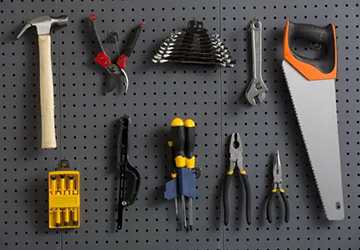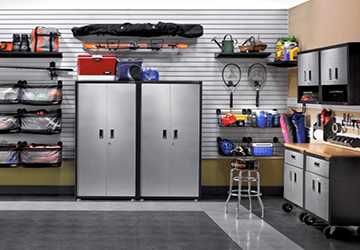How to Master Basic DIY Home Repairs
Embarking on mastering basic DIY repairs is like unlocking a superpower—your inner practical hero. The ability to repair, create, and improve items in your home not only saves you money but also gives you a sense of accomplishment. This guide will cover essential tips to help you explore the DIY world with confidence and skill. Learn from your mistakes, connect with a vibrant DIY community, and get ready to unleash your inner practical hero and turn your home into your creative haven.

Invest in quality tools.
Before you begin repairs, ensure you have the right tools. You don't need a fancy, expensive kit; use it. Just a few basics can go a long way. Start by gathering a good set of screwdrivers (slotted and Phillips), pliers, tape measure, hammer, and adjustable wrench. These tools cover a variety of repairs around the home. However, quality matters. While going for the cheapest option may be tempting, investing in durable tools will pay off in the long run. They last longer, making your DIY adventures smoother. Plus, there's nothing worse than a screwdriver getting damaged during repairs!
Learn more online
The internet is a treasure trove of DIY knowledge. You'll find step-by-step instructions and video tutorials for almost everything, from fixing a leaky faucet to patching drywall. Sites like YouTube, DIY forums, and home improvement blogs provide information for every skill level. If you're working on a new project, take the time to watch some tutorials and understand the process. Knowing these steps will boost your confidence and help you avoid common pitfalls. Remember, there is no shame in being a beginner - everyone starts somewhere!
Safety first: know your limits
DIY projects are a great way to save money and learn new skills, but it's also essential to recognize your limitations. Some tasks require specialized knowledge and performing these tasks without the appropriate knowledge can lead to costly errors or security risks. If you have electrical work, plumbing, or structural issues that can't be easily fixed, it's best to call a professional. Don't let pride jeopardize your safety or the integrity of your family. For major repairs, professional services will ensure the job is completed smoothly.
Start with small things and increase your confidence
Rome was built a day ago, and neither will your craftsmanship. Start with small, manageable projects to build confidence and improve your skills. Fix a leaky faucet, tighten a loose cabinet handle, or patch a small hole in the wall. As you complete these smaller tasks, you'll better understand basic repairs and have the confidence to tackle larger projects. It's like levelling up in a DIY video game - start with simple missions before tackling epic boss battles.
Organize your DIY space.
A well-organized workplace can make a big difference. Whether you have your workshop or just a corner of your garage, keeping your tools and materials organized will save you time and hassle. Invest in storage solutions like bins, shelves, and pegboards to ensure everything is accessible. Labelling containers can also help you quickly find suitable screws or nails when you need them. A tidy workspace isn't just for show; it increases efficiency and makes your home improvement job more enjoyable.

Learn from your mistakes: Leverage the DIY learning curve.
Taking on a DIY project means overcoming a learning curve; mistakes are just pitfalls on the road to mastery. Don't let mistakes discourage you but view them as valuable lessons. Take the time to analyze the problem, understand the root cause, and find a solution. Is the paint job not turning out as expected? It could be the technique used or the type of paint. By learning from your mistakes, you solve immediate problems, gain new knowledge, and prepare for future endeavors. Remember, the best DIYers are not without mistakes. They are good at turning setbacks into springboards for progress.
Connect with the DIY community: learn together, succeed together
Home improvement doesn’t have to be a lonely pursuit. Working with a local DIY group or online community is like a turbo boost to developing your skills. Whether you attend a community workshop or participate in a virtual forum, connecting with other DIY enthusiasts opens a world of shared experiences and collective wisdom. Share stories, get advice, and discover clever solutions to common challenges. Someone in the DIY community may have encountered a similar problem and found a great solution. Studying together builds camaraderie and accelerates your development as a do-it-yourselfer.
Keep a DIY Diary: Your Personalized DIY Manual
Think of your DIY journal as your toolbox's MVP (most valuable player). Keeping detailed records of your projects may seem meticulous, but the benefits are enormous. Write down the tools and materials, the step-by-step process, and any obstacles encountered. This journal will become your DIY manual, filled with insights from practical experience. You'll have a reference guide the next time you revisit a similar project or encounter a similar challenge. It's not just about achieving success; Occasional setbacks recorded in a journal can become valuable indicators of growth and progress.
Practice regular maintenance: take proactive care of your home.
Think of your home as a living, breathing structure that needs regular inspections. Routine maintenance is the proactive care your home deserves. Create a schedule of inspections and preventive measures, from checking leaky faucets to tightening loose hinges to cleaning clogged gutters. By addressing minor issues promptly, you can prevent them from developing into more extensive, costly repairs. This proactive approach saves you time and money and ensures your family's overall health. This equates to maintaining a healthy lifestyle for your living space - a little TLC can keep it vibrant.
Conclusion
As we wrap up our exploration of the world of home improvement, remember that your journey is an ongoing adventure. Every project, whether a success or a learning experience, helps you grow in skills and knowledge. See mistakes as steppingstones, connect with the DIY community to share and learn, record your successes in a DIY journal, and be proactive about maintaining your home. Your commitment to mastering home improvement isn't just about fixing things but solving problems. It's about creating a lifestyle of self-reliance and creativity. So, let your DIY adventures continue, and may your home always reflect the ingenuity and care you put into your design process. Happy repairing!





